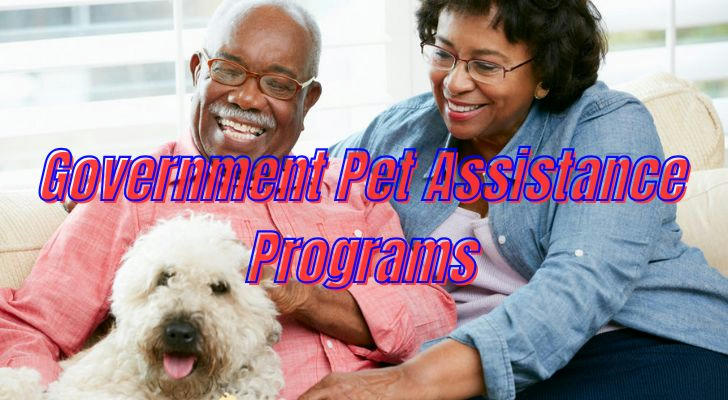📜 How Government Pet Assistance Programs Are Helping Pet Owners Save Thousands
🏛️📢 Government pet assistance program: A Lifesaver for Seniors and Low-Income Families
As veterinary costs skyrocket across the U.S., many families are struggling to afford even the most basic care for their beloved pets. From routine check-ups to emergency surgeries, unexpected vet bills can leave owners facing tough financial choices.
But there’s good news: Government Pet Assistance Programs are stepping in to help—making affordable pet care a reality for low-income families, seniors, and anyone facing financial hardship.

The Rising Cost of Pet Care — 🐾 Why You Should Consider Government Pet Assistance Program?
Over 60% of American households own a pet. For millions of families, pets are more than just animals—they are companions, emotional support, and part of the family.
But veterinary expenses are no small matter:
- A typical vet visit costs $100 to $300
- Emergency treatments can reach thousands of dollars
- Ongoing care for chronic illnesses adds up fast
Without support, many families are forced to choose between their pet's health and their household budget.
💡 What Are Government Pet Assistance Programs?
While traditional pet insurance is often provided by private companies, various Government Pet Assistance Programs—along with nonprofit partnerships—help subsidize veterinary costs for eligible families.
Here’s how they work:
✅ State & Local Pet Health Initiatives
Many cities and counties offer income-based veterinary support:
- Los Angeles County Animal Care: Mobile clinics for low-cost vaccines, microchipping, spay/neuter services
- Cook County, Illinois: Vouchers for low-income pet owners through nonprofit partnerships
✅ Senior Pet Assistance Programs
Seniors aged 65+ can access special support:
- Meals on Wheels Pet Assistance: Basic veterinary care and food subsidies
- AARP-Approved Insurance: Providers like ASPCA offer exclusive senior discounts and simplified claims
✅ Nonprofit and Emergency Relief
- RedRover Relief Grants: Up to $200 for emergency vet care, no repayment required
- Local Rescue Partners: Discounts and subsidized care through shelters and community programs
📅 How Old Is Your Pet Really? — Pet Age Comparison Table
Did you know your pet’s age in "human years" could be very different from what you expect? Understanding your pet's true life stage helps determine the right care — and highlights why affordable health coverage through Government Pet Assistance Programs is so important.
| Pet Type | Pet's Age (Years) | Equivalent Human Age | Recommended Care Focus |
|---|---|---|---|
| Dog (Small Breed) 🐕🦺 | 1 | 15 | Puppy care, vaccines, accident-only coverage |
| 5 | 36 | Routine check-ups, wellness plans | |
| 10 | 56 | Senior care, chronic condition coverage | |
| Dog (Large Breed) 🐕 | 1 | 14 | Basic health screening, spay/neuter |
| 5 | 45 | Active monitoring, prevent joint issues | |
| 8 | 66 | Senior-focused vet visits, specialized plans | |
| Cat 🐈 | 1 | 15 | Kitten vaccines, accident-only coverage |
| 7 | 44 | Regular wellness exams, dental care | |
| 12 | 64 | Senior monitoring, increased vet needs |
🐾 Pro Tip: Senior pets — typically dogs over 7 years and cats over 10 years — are more prone to illnesses. Many Government Pet Assistance Programs or low-income insurance plans offer special support for older pets, with no upper age limits in select policies.
🏥 Budget-Friendly Pet Insurance for Low-Income Families
If you’re seeking reliable, affordable pet insurance, these providers understand your needs:
ASPCA Pet Health Insurance
✔️ Plans starting under $15/month
✔️ Adjustable deductibles ($100-$500)
✔️ Coverage for breed-specific conditions & behavioral care
PetFirst Pet Insurance
✔️ No upper age limits (perfect for senior pets)
✔️ Multi-pet discounts available
✔️ Routine care add-ons starting at $9.95/month
🌟 Tip: Accident-only plans are ideal for young pets, with premiums as low as $10-$18/month, covering injuries, poisoning, and fractures.
📲 How to Apply for Government Pet Assistance Programs
🔍 Pro Tip: Search "Government Pet Assistance Program" to find local resources fast.
Getting help is easier than you think:
- Contact Local Animal Services: Most cities list pet assistance resources online
- Check Your State’s Aging Services: Senior centers often offer pet programs in partnership with Meals on Wheels
- Explore Nonprofit-Partnered Plans: Providers like ASPCA collaborate with charities to offer special rates
- Ask Your Veterinarian: Many clinics know about available grants or income-based care programs
Compare programs online and get expert advice to choose the right assistance program for your pet.
💸 Hidden Ways to Save on Vet Costs
Want to save hundreds per year? Here’s how:
- Tune Your Deductible: Opt for a $500 deductible to lower monthly premiums by up to 40%
- Compare Providers: Sites like PetInsuranceReview reveal real pricing differences
- Annual Payments: Save 5-8% by paying annually instead of monthly
- Senior Discounts: Look for age-specific plans like PetFirst’s "Golden Paws" option
❤️ Conclusion: Protect Your Pet With Government Programs - best opportunity
Your pet's health isn't a luxury—it’s a necessity. Thanks to Government Pet Assistance Programs, affordable veterinary care is within reach for families of all income levels.
Whether you’re struggling with unexpected vet bills or simply planning ahead, these programs can save you thousands and ensure your furry friend stays healthy and happy.
Take the first step today—your pet deserves it.
